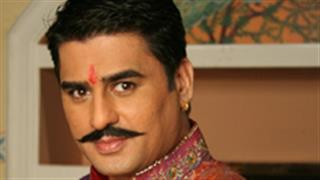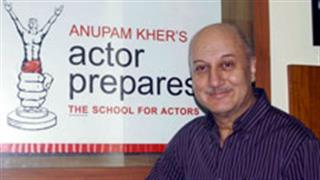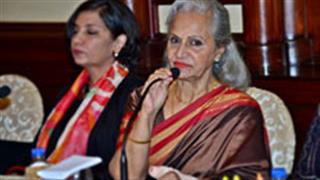The "Gangs of Wasseypur" actor was in the office of Focus News Network in Noida, in the NCR region, that has roped him for its "Kehta Hai India with Nawazuddin Siddiqui" election special series that will go on the air from April 12 at 9 p.m.
Making his small screen debut with the show, the 39-year-old actor travelled to Patna, Lucknow, Varanasi and Jaipur where he interacted with the locals: from rickshaw pullers to paanwaalas, and from students to shopkeepers - and got a sense of their outlook towards the general elections and governance. He will be shooting for the last episode in the capital April 11.
"It was sad to see that there are many people who have no idea why their vote is important. Some are voting because someone has suggested that they should vote for a particular party, and there are many who vote for those candidates who pay them to vote," Siddiqui told IANS in an interview.
"I have personally felt that the government doesn't want people to get educated because that will give power to people and they don't want that," he said, adding that it is an "ugly truth" to see most of the people are "clueless" about the power of the ballot.
It was also for the first time the actor, who is known for his roles in "Kahaani" and "The Lunchbox", has directly interacted with the politicians and asked them uncomfortable questions related to development and political rivalries.
For the show, he interviewed Rajasthan Chief Minister Vasundhara Raje, Uttar Pradesh Chief Minister Akhilesh Yadav, BJP president Rajnath Singh, Rashtriya Janata Dal chief Lalu Prasad and actor-turned politician Shatrughan Sinha.
From these interactions, he concluded that politicians are masters of giving convoluted answers.
"They all speak in a universal language of not giving straight and honest answers. They have answers but they will give you roundabout answers," he said.
Admitting he doesn't have much interest in politics and hasn't any favourite political party, Siddiqui said through the show he was able to observe that Indian politicians use the "blame game" strategy and shy away from doing serious work.
"Our politicians will talk of development but how many of them actually do it? A rickshaw puller will always be a rickshaw puller; his destiny will never change," he pointed out.

"They (politicians) know how to do 'blame' politics," he added.
For someone who is known to get under the skin of the character he enacts on the screen, the "spontaneous" role of a reporter was a challenge for Siddiqui.
"I agreed to do it because it was a new experience and gave me an opportunity to get out of my comfort zone. It was a challenging thing to do because films and television are two different mediums," he said.
"In films you get a script and have enough time to remember your dialogues, whereas for this show, I was given a new script every day. It had to be spontaneous, and I had to talk non-stop in front of camera, something you don't get to do much in films," he pointed out.
Nevertheless, it was an experience when he had to be up by 5 a.m, be on the road most of the time, travelled in buses, tongas (horse carts) and rickshaws, braved the dust and sun, and hit the bed only after his voice-overs had left him satisfied.
"It was tough but a wonderful experience," he concluded.




















